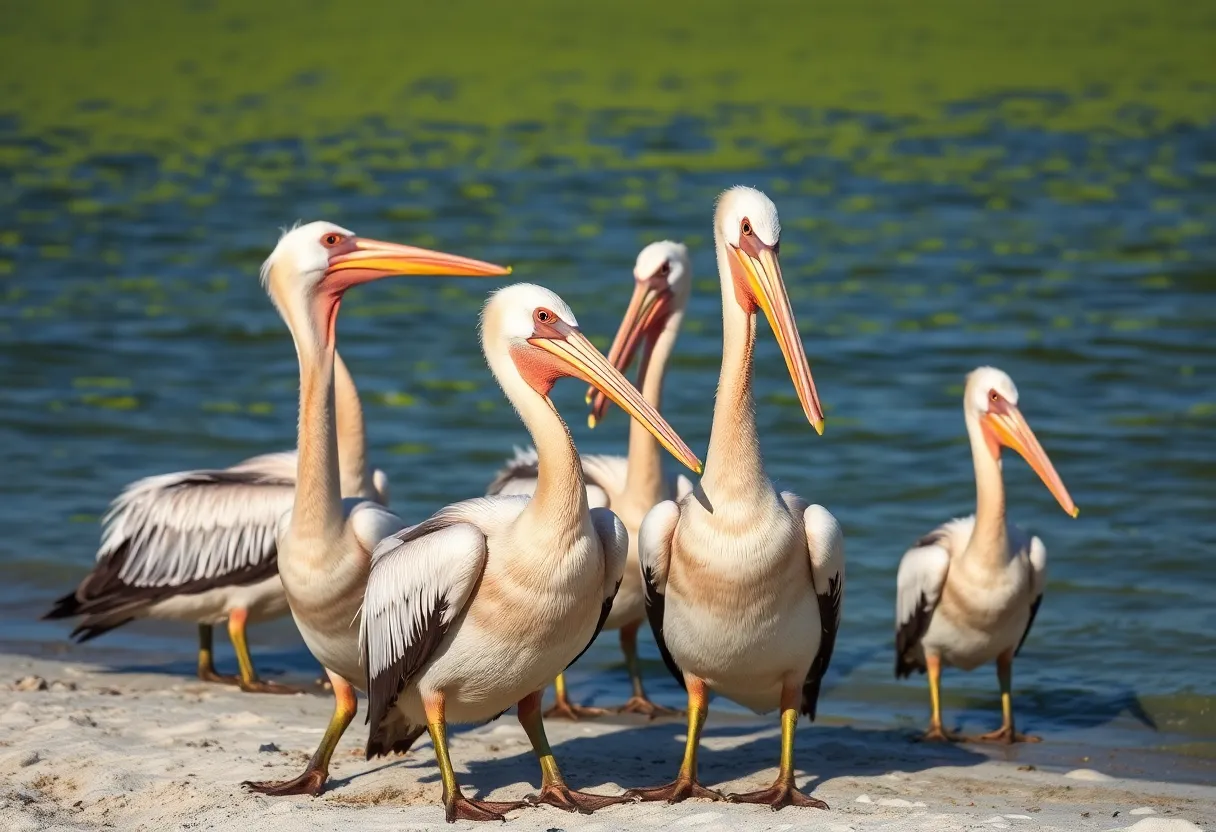News Summary
The Wetlands and Wildlife Care Center in Huntington Beach is dealing with a crisis as they treat numerous brown pelicans suffering from severe domoic acid poisoning linked to toxic algae blooms. This health emergency has been worsened by recent wildfires in nearby Los Angeles. WWCC is facing funding challenges despite treating thousands of wildlife patients and is urgently seeking community support and donations to help manage operational costs exceeding $1 million.
Huntington Beach Faces Seabird Crisis Due to Domoic Acid Poisoning
The Wetlands and Wildlife Care Center (WWCC) in Huntington Beach is currently overwhelmed as it treats numerous brown pelicans afflicted by domoic acid poisoning. This health crisis has been linked to toxic algae blooms, which experts say have been exacerbated by recent wildfires in Los Angeles.
WWCC, a nonprofit organization primarily run by volunteers, is dedicated to rehabilitating various wildlife, including seabirds, raptors, hummingbirds, and injured animals. Earlier this year, the center successfully rescued nearly 200 emaciated seabirds suffering from the effects of malnutrition and toxicity, with many of these birds later being released back into their natural habitats.
In 2022, WWCC treated a staggering total of 8,176 wildlife patients across Orange County and Long Beach. Notably, over 3,708 of these patients—accounting for more than 45% of the total—came from unincorporated areas served by Orange County Animal Care (OCAC), which includes Huntington Beach. Despite this significant influx of patients, WWCC does not receive any funding from Orange County, following the expiration of its contract in August last year.
Funding Challenges and Operational Costs
During negotiations, Orange County offered WWCC a mere $12,000 annually for animal treatment, which the center deemed insufficient considering the volume of wildlife it cares for from county areas. If the county were to compensate WWCC at a rate of $125 per animal treated, the estimated annual funding could soar to approximately $463,500, aiding the center in meeting its operational expenses, which total around $900,000 each year.
This spring, the situation reached critical levels as dozens of emaciated pelicans were discovered on local beaches. The costs of recovery are significant, with each bird consuming up to $45 worth of fish daily. In June, OCAC confirmed they had brought in 61 living wild animals to WWCC, yet the center did not receive any direct financial support for this service.
Escalating Wildlife Crisis
Officials at WWCC are now actively campaigning for increased funding and partnerships with local cities that contract with OCAC to ensure a sustainable model for animal care. The demand for assistance has surged due to ongoing harmful algae blooms, leading to an alarming increase in sea animal patients, with severe disorientation and aggressive behavior being reported in seabirds and marine mammals.
This domoic acid poisoning event has been termed the worst in recorded history, as marine facilities around the region have become overwhelmed with sick animals. Reports indicate that 550 sea lions and dolphins have also been treated by the Marine Mammal Care Center, showcasing the widespread impact of the toxic algae.
Call for Support from the Community
WWCC is actively seeking financial donations and more volunteers, particularly those with wildlife rehabilitation experience, to help cope with the current crisis. Public support is essential, as the annual operational costs for WWCC exceed $1 million. As the situation continues to develop, the need for community involvement and action to support the health and recovery of local wildlife is more pressing than ever.
Deeper Dive: News & Info About This Topic
HERE Resources
Successful Release of 13 Brown Pelicans in Huntington Beach
Twelve Pelicans Released After Recovery from Domoic Acid Poisoning
WWCC Faces Crisis as Wildlife Distress Peaks Amid Toxic Algae Bloom
Additional Resources
- ABC7: Sick Birds Flooding Wildlife Care Center
- Wikipedia: Domoic Acid
- CBS News: Brown Pelicans Domoic Acid Poisoning
- Google Search: Domoic Acid Poisoning
- KTLA: Orange County Wildlife Center Needs Help
- Google Scholar: Wildlife Rehabilitation
- Orange County Register: Wetlands Wildlife Care Center
- Encyclopedia Britannica: Wildlife Rehabilitation
- Patch: Help Baby Wildlife Fundraiser
- Google News: Wetlands and Wildlife Care Center

Author: STAFF HERE COSTA MESA WRITER
The COSTA MESA STAFF WRITER represents the experienced team at HERECostaMesa.com, your go-to source for actionable local news and information in Costa Mesa, Orange County, and beyond. Specializing in "news you can use," we cover essential topics like product reviews for personal and business needs, local business directories, politics, real estate trends, neighborhood insights, and state news affecting the area—with deep expertise drawn from years of dedicated reporting and strong community input, including local press releases and business updates. We deliver top reporting on high-value events such as the OC Fair, Concerts in the Park, and Fish Fry. Our coverage extends to key organizations like the Costa Mesa Chamber of Commerce and Boys & Girls Clubs of Central Orange Coast, plus leading businesses in retail, fashion, and technology that power the local economy such as Vans, Experian, and South Coast Plaza. As part of the broader HERE network, including HEREAnaheim.com, HEREBeverlyHills.com, HERECoronado.com, HEREHollywood.com, HEREHuntingtonBeach.com, HERELongBeach.com, HERELosAngeles.com, HEREMissionViejo.com, HERESanDiego.com, and HERESantaAna.com, we provide comprehensive, credible insights into California's dynamic landscape.


